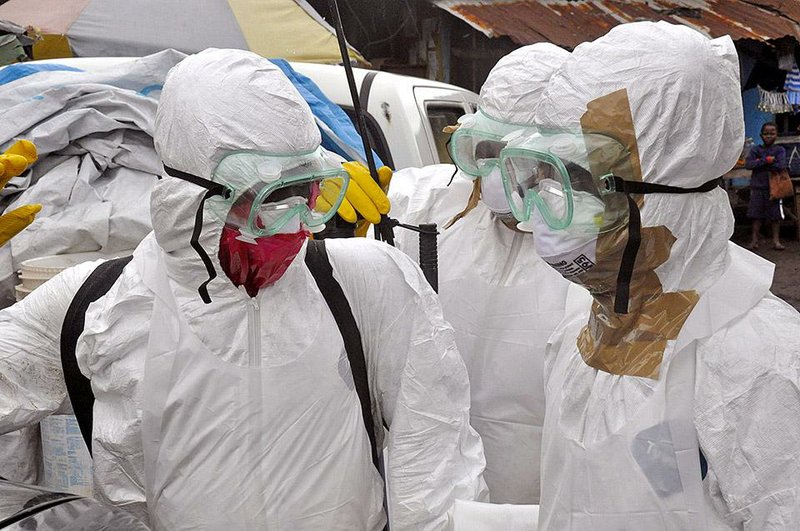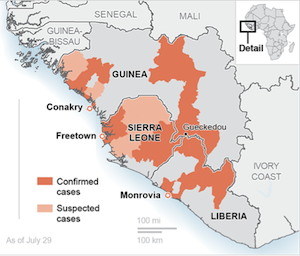MONROVIA, Liberia -- Months into the Ebola outbreak, Liberia remains desperately short on everything needed to halt the rise in deaths and infections -- burial teams for the dead, ambulances for the sick, treatment centers for patients, gloves for doctors and nurses.
But it is shortest on something intangible: the trust needed to stop the disease from spreading.
Dr. Mosoka Fallah, an epidemiologist and immunologist who grew up in Monrovia's poorest neighborhoods before studying at Harvard, has been crisscrossing the capital in a race to repair that rift. Neighborhood by neighborhood, block by block, shack by shack, he is battling the disease across this crowded capital, seeking the cooperation of residents who are distrustful of the government and its faltering response to the deadliest Ebola epidemic ever recorded.
"If people don't trust you, they can hide a body, and you'll never know," Fallah said. "And Ebola will keep spreading. They've got to trust you, but we don't have the luxury of time."
With his experience straddling vastly different worlds, Fallah acts as a rare bridge: between community leaders and the Health Ministry, where he is an unpaid adviser; and between the government and international organizations, which have the money to back his efforts. But the scale of the task is daunting. He is trying to beat Ebola in a city of 1.5 million people where the disease is expanding exponentially, where entire families search in vain for medical care, and where the main hospital is dangerously overwhelmed, plagued by electrical fires, floods and the deaths of health workers infected with the disease.
Fallah has slowly begun winning over the city's toughest neighborhood, West Point, the seaside slum where he spent two years of his childhood. Deadly clashes between angry residents and soldiers occurred recently after Liberia's government placed the entire neighborhood under quarantine. The 10-day cordon, enforced by the army and the police, merely deepened the mistrust of the government in the city's slums, the very neighborhoods most affected by Ebola.
Fallah plunged into West Point, deciding with community leaders to battle Ebola by resurrecting a survival mechanism used during Liberia's catastrophic 14-year civil war.
They divided West Point into zones. Surveillance teams of volunteers overseen by Fallah now scour West Point, searching for information about a dead or sick person, hoping to identify victims and remove the bodies before the disease can be passed on.
"Dr. Fallah has taken the situation in West Point as if he were living here," said Kenneth Martu, a political organizer in West Point. "We can say openly: Had he not been here, things would have gotten far worse."
Two days after the government lifted the quarantine in West Point, the Health Ministry asked Fallah to start using the civil war-era zone system in two other Ebola-stricken neighborhoods.
Monrovia is the first city to face the full onslaught of Ebola. Tracing the contacts of Ebola victims has never been attempted on this scale, but Fallah's team has only five vehicles to monitor hundreds of thousands of people. One vehicle was in the shop for five days, so Fallah used his own.
In West Point, a slum of up to 120,000 people, Fallah deployed 15 volunteers to track 150 people who may have been exposed to the virus. The tracers fan out early in the morning to catch the people at home -- they are supposed to stay indoors, but many do not -- and to minimize contact with an often hostile community.
"On the field, as we are going, they are cursing us, passing around, talking plenty," said Marie Harding, a tracing supervisor.
The government's lifting of the quarantine after 10 days also gave West Point a conflicting message. Many rejoiced at the move but interpreted it as proof that there was no Ebola in their community.
On the Sunday after the quarantine was lifted, churchgoers celebrated what many saw as West Point's deliverance from Ebola. Inside the Dominion Life Church, next to an Ebola holding center, the faithful danced and -- disregarding awareness campaigns to avoid touching and risk exchanging body fluids -- shook hands and grasped one another's arms with fervor.
"No, no, no, no," the Rev. William Morlu, the church's senior pastor, said when asked whether Ebola was present in West Point.
At the Church of Pentecost, Emmanuel Oben, 45, the chairman of a local PTA, said that the government was "not sincere." But Fallah, whom he had met twice, was "a man that everybody wants to work with," he said.
"People trust him," he said. "He was once like us."
On an afternoon of heavy rain, Fallah drove out to two neighborhoods where residents had begun organizing Ebola awareness campaigns on their own. In the face of the hysteria gripping the capital, they were joining forces and fighting back.
In one area, volunteers such as Obediah Daykeay, 22, who had read up on Ebola in an Internet cafe, were instructing neighbors on the use of bleach and water to wash their hands. They had invited Fallah after hearing him on the radio.
"We are trying our best with the few resources we have," Daykeay said. "Nobody else has come here."
Doctor's evacuation snags
Meanwhile Saturday, the World Health Organization said it could not meet a request from Sierra Leone to evacuate a doctor who contracted Ebola.
Dr. Olivet Buck is the fourth doctor from Sierra Leone to come down with Ebola, which has been blamed for 2,400 deaths in West Africa, according to the WHO. Liberia, Sierra Leone and Guinea have recorded the vast majority of cases.
Sierra Leone requested funds from the WHO to evacuate the doctor to Germany on Friday. A letter from President Ernest Bai Koroma's office said he had approved Buck's evacuation to a hospital in Hamburg, Germany, "where they are in readiness to receive her."
Buck, a citizen of Sierra Leone, would be the first doctor from one of the countries hit hardest by Ebola to receive treatment abroad. The other three doctors from Sierra Leone died in the country.
The letter, sent to the WHO's country representative on Friday and seen Saturday by The Associated Press, said Buck tested positive for Ebola on Tuesday.
"We have been informed that Dr. Buck is quite ill," it said.
A spokesman for WHO said Saturday, however, that it could not comply with the request and instead would work to give Buck "the best care possible" in Sierra Leone, including access to experimental drugs.
"WHO is unable to organize evacuation of this doctor to [Germany] but is exploring all options on how to ensure best care," WHO spokesman Tarik Jasarevic said.
A total of 301 health workers had become infected with the disease as of Sept. 7 in Guinea, Liberia and Sierra Leone, according to WHO. Of that tally, which included suspected and probable cases in addition to confirmed ones, 144 had died.
The infections have exacerbated shortages of doctors and nurses in West African countries that were already low on skilled health personnel.
So far, only foreign health and aid workers have been evacuated abroad from Sierra Leone and Liberia for treatment.
Information for this article was contributed by Norimitsu Onishi of The New York Times and by Clarence Roy-Macaulay, Robbie Corey-Boulet and Jonathan Paye-Layleh of The Associated Press.
A Section on 09/14/2014

